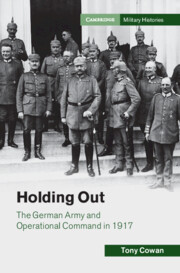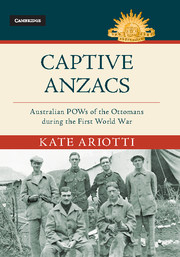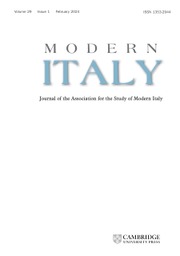Holding Out
This is a ground-breaking study of German operational command during a critical phase of the First World War from November 1916 to the eve of the third battle of Ypres. The situation faced by the German army on the Western Front in 1917 was very different from the one anticipated in pre-war doctrine and Holding Out examines how German commanders and staff officers adapted. Tony Cowan analyses key command tasks to get under the skin of the army's command culture, internal politics and battle management systems from co-ordinating the troops, matériel and different levels of command needed to fight a modern battle to continuously learning and applying lessons from the ever-changing Western Front. His detailed analysis of the German defeat of the 1917 Entente spring offensive sheds new light on how the army and Germany were able to hold out so long during the war against increasing odds.
- Makes new empirical material available to non-German speaking researchers on the First World War
- Sheds new light on the battle of Arras and Nivelle offensive
- For scholars of military history, the history of the First World War, imperial Germany and war studies
Reviews & endorsements
‘Even the well-informed reader will learn much about how the German army functioned from Holding Out. The book's conclusions go far beyond 1917 and are important to sharpen our understanding of the German army during the entire war. Cowan fights against the idea of the German army being the ‘benchmark’ of military quality and offers a much more nuanced picture of a military organism with great strengths and great weaknesses.’ Holger Afflerbach, author of On a Knife Edge
‘Tony Cowan’s fascinating case study of the battles of early 1917 is a work of meticulous scholarship and deep insight which sets a new standard for our understanding of war on the Western Front, and of the strengths and weaknesses of the German army in the first half of the twentieth century.’ Jonathan Boff, author of Haig’s Enemy
‘Holding Out demonstrates the power and resilience of the German war machine by treating it as an organisation run by real, often flawed, people working in situations of great stress and with finite resources. For that reason it offers a far more convincing appraisal of the German army in the First World War than the work of its many apologists.’ Paul Skrebels, Sabretache
‘There is no doubt that the German army in the Great War was highly professional and able to learn and adapt, that is why it was able to hold out for so long in the face of increasingly unfavourable odds. This dense, detailed and fascinating tour de force tells us how it was done.’ John Spencer, The Western Front Association
'… detailed and fascinating …' John Spencer, The Western Front Association
‘This book exudes Cowan’s determination to bring the German army down a peg, because of the mythologically impressive character to which it has often been ascribed … The reader can gain from this book further information to consider in understanding the character, practices, and execution of an army that was by no means perfect but that inarguably resisted the combined efforts of powerful enemies on multiple fighting fronts for several years.’ Nicholas Sambaluk, H-Net Reviews
Product details
June 2023Hardback
9781108830232
386 pages
237 × 162 × 23 mm
0.67kg
Available
Table of Contents
- Comparative ranks
- Chronology
- Abbreviations
- Maps
- Introduction
- 1. Context
- 2. Principles
- 3. Organisation
- 4. Personality
- 5. Intelligence
- 6. Communication
- 7. Learning
- 8. Performance
- Conclusion.







.jpg)
.jpg)
